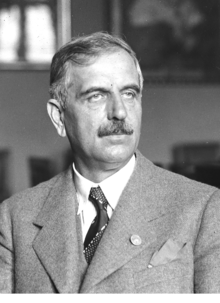Stoyan Romanski
Stoyan Romanski was a Bulgarian Slavic scientist, ethnographer and secretary of the Bulgarian Academy of Sciences.
Stoyan Romanski | |
|---|---|
 | |
| Born | Stoyan Marinov Romanski 24 February 1882 Orhanie, Bulgaria |
| Died | 26 February 1959 (aged 77) Sofia, Bulgaria |
| Nationality | Bulgarian |
| Other names | Стоян Маринов Романски |
| Occupation | linguist and ethnographer |
| Known for | Bulgarian studies |
Notable work | Bulgarians in Wallachia and Moldova |
Graduated Slavic Philology at Sofia University “St. Kliment Ohridski” (1905). Specialized at the University of Leipzig under the German linguists August Leskien and Gustav Weigand in the period 1905–1907.
In Leipzig, he defended his doctoral thesis on "The Teachings of the Wallachian Voivode Neagoe Basarab to His Son Theodosius" (1908). He worked as an assistant to Weigand in 1907–1909. Since 1909 he has been Assistant Professor of Slavic Linguistics and Ethnography at Sofia University. Professor and Head of the Department of Bulgarian Language and Slavic Ethnography (since 1922), Editor-in-Chief of the Slavic Institute at Sofia University (1934-1937). First director of the Bulgarian Language Institute at the Bulgarian Academy of Sciences (1947-1951) and head of the Bulgarian Dictionary Section of the Institute (1951-1958).
Director of the Ethnographic Institute with Museum at the Bulgarian Academy of Sciences (1949-1958).
Academician since 1929, member of the Bulgarian Archeological Institute since 1922, the Taras Shevchenko Scientific Society in Lviv, the Romanian Historical Society in Bucharest, the Slavic Institute in Prague.[1]
The scientist is mostly known for his interpretations of Vlach-Bulgarian royal charters.